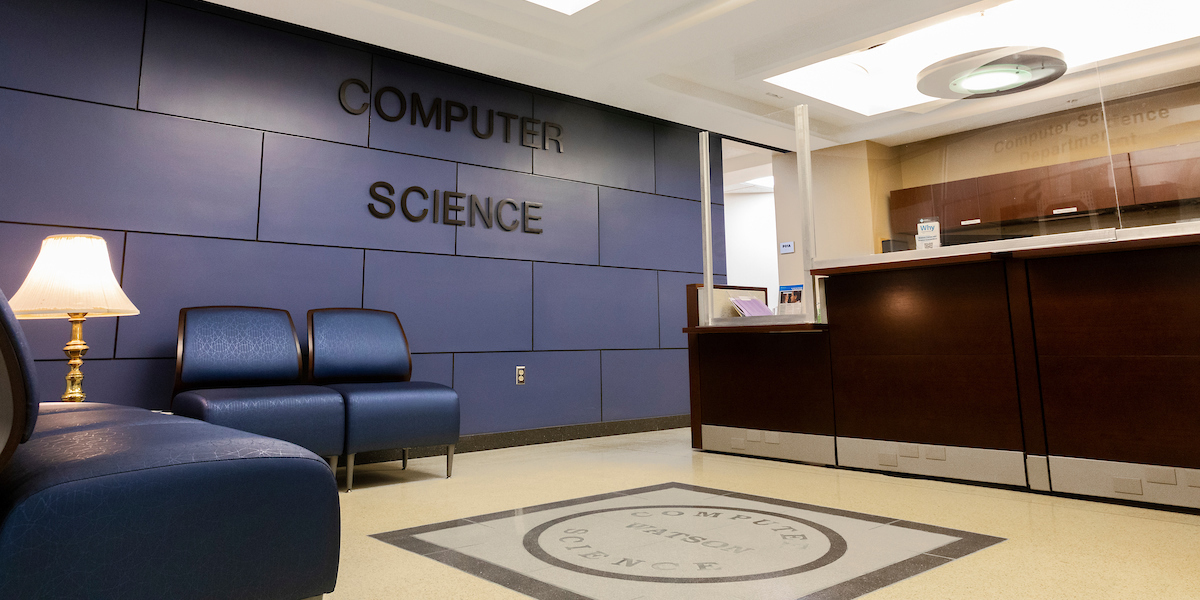Computer Science Department celebrates 2021-22 research, CyberCorps grant

The Department of Computer Science at the Thomas J. Watson College of Engineering and Applied Science has had an exceptional academic year in 2021-22, with several exciting announcements for students and faculty.
The CS Department completed a successful ABET accreditation review in September 2021. Also, because of expanded programs (as outlined below), the department is hiring six tenure-track faculty members and two full-time lecturers.
Total CS enrollment for the spring 2022 semester was 1,018 (567 undergraduates, 81 dual-degree program students, 294 master’s students and 76 PhD students).
$3.5 million for CyberCorps scholarships
The National Science Foundation awarded the University a $3.5 million grant through its CyberCorps Scholarship for Service (SFS) program, which will fund new scholarships for two dozen students who plan to join the workforce as cybersecurity professionals. It will be overseen by faculty members from the Department of Computer Science and the Department of Electrical and Computer Engineering. Leading the SFS program at Binghamton will be CS Associate Professor Ping Yang, the director of the Center for Information Assurance and Cybersecurity (CIAC).
MSIS program established
Starting in fall 2022, the CS Department will offer a Master of Science in Information Systems that is intended for those whose career paths are focused on computer hardware and software systems operations and maintenance. It will focus on computer systems from a user/application perspective.
In related news, two tracks will be added to the MS Computer Science program: artificial intelligence and cybersecurity.
Meng named distinguished service professor
SUNY has elevated Weiyi Meng, chair of the CS Department, to distinguished service professor for his extraordinary record as a teacher, researcher, scholar and leader in academia. Meng’s service-focused philosophy is based on being a good citizen and making a positive impact. In addition to being an outstanding academician as an author of three books and over 150 papers, he has provided long and effective service as the chair of the Computer Science Department and a Watson College associate dean. Furthermore, he has helped to organize and run over 100 conferences all over the globe.
Shin wins NSF CAREER Award
Assistant Professor Seunghee Shin received a five-year, $500,000 NSF CAREER Award to research his ideas for improving the speed and reliability of cloud computing using SmartNIC technology. The CAREER Award supports early-career faculty who have the potential to serve as academic role models in research and education.
Other research news
A feature in the fall 2021 edition of the Binghamton University magazine focused on Assistant Professor Jeremy Blackburn’s deep dives into the darker corners of Reddit, Parler, Twitter 4chan and other social-media sites.
A study from Assistant Professor Weiying Dai and lecturer George Weinschenk, MA ‘01, PhD ’07, tracked how practicing meditation for just a couple of months changed the brain patterns of 10 students in the Binghamton University Scholars Program. The meditation training led to faster switching between the brain’s two general states of consciousness — the default mode network, which is active when the brain is at wakeful rest and not focused on the outside world, and the dorsal attention network, which engages for attention-demanding tasks.
Dai is also a co-PI on a $587,853 grant from the NSF’s Biomechanics and Mechanobiology Program to use computer modeling and advanced imaging of developing fetal brains to better understand the growth and folding that make each human brain unique. Leading the research will be Assistant Professor Mir Jalil Razavi from the Department of Mechanical Engineering.
Assistant Professor Shiqi Zhang led a team that created a system it calls Augmented Reality for Robots Collaborating with a Human — ARROCH for short. It is meant to bridge the human communication gap with multiple robots using augmented reality (AR) to add digital visuals, sound or other stimuli for a real-world view.
Assistant Professor Hoda Naghibijouybari received a $534,595 NSF grant to study side-channel attacks, which happen when a malicious application can extract sensitive information from other applications running on the same system.
Student news
The 2021 Watson Review magazine focused on women in engineering and computer science at Watson College, and one feature highlighted leaders for Watson student organizations. Theresa Gundel ’21 was interviewed about her time as president for HackBU and the challenges she sometimes faced as a woman studying computer science.
Adiel Felsen, a double major in computer science and mathematics, discussed how his studies of machine learning led to research on biomedical imaging.
Alumni news
Two CS alumni talked about the importance of supporting Binghamton University and Watson College through monetary gifts and volunteer service.
Vladimir Andral ’95, now the director of product management for global payments at Visa, gives back to Watson College to help those students facing struggles similar to the ones he had while an undergraduate at Binghamton.
Susan Wu ’93, a member of Watson College’s Metro Advisory Board, connects with the University by raising funds, offering an industry perspective on education goals and curriculum, making important connections, and helping students and alumni along their career paths. She currently works as a director, portfolio manager and trading strategist for Bank of America Merrill Lynch.

